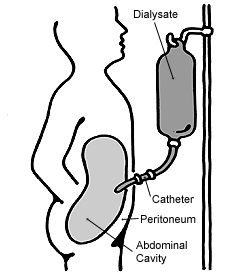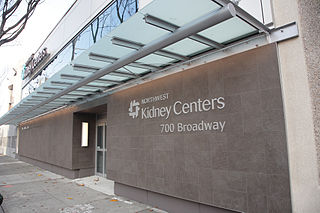Related Research Articles

Nephrology is a specialty of adult internal medicine and pediatric medicine that concerns the study of the kidneys, specifically normal kidney function and kidney disease, the preservation of kidney health, and the treatment of kidney disease, from diet and medication to renal replacement therapy. The word “renal” is an adjective meaning “relating to the kidneys”, and its roots are French or late Latin. Whereas according to some opinions, "renal" and "nephro" should be replaced with "kidney" in scientific writings such as "kidney medicine" or "kidney replacement therapy", other experts have advocated preserving the use of renal and nephro as appropriate including in "nephrology" and "renal replacement therapy", respectively.

Autosomal dominant polycystic kidney disease (ADPKD) is the most prevalent, potentially lethal, monogenic human disorder. It is associated with large interfamilial and intrafamilial variability, which can be explained to a large extent by its genetic heterogeneity and modifier genes. It is also the most common of the inherited cystic kidney diseases — a group of disorders with related but distinct pathogenesis, characterized by the development of renal cysts and various extrarenal manifestations, which in case of ADPKD include cysts in other organs, such as the liver, seminal vesicles, pancreas, and arachnoid membrane, as well as other abnormalities, such as intracranial aneurysms and dolichoectasias, aortic root dilatation and aneurysms, mitral valve prolapse, and abdominal wall hernias. Over 50% of patients with ADPKD eventually develop end stage kidney disease and require dialysis or kidney transplantation. ADPKD is estimated to affect at least one in every 1000 individuals worldwide, making this disease the most common inherited kidney disorder with a diagnosed prevalence of 1:2000 and incidence of 1:3000-1:8000 in a global scale.

Kidney dialysis is the process of removing excess water, solutes, and toxins from the blood in people whose kidneys can no longer perform these functions naturally. This is referred to as renal replacement therapy. The first successful dialysis was performed in 1943.

Kidney failure, also known as end-stage kidney disease, is a medical condition in which the kidneys can no longer adequately filter waste products from the blood, functioning at less than 15% of normal levels. Kidney failure is classified as either acute kidney failure, which develops rapidly and may resolve; and chronic kidney failure, which develops slowly and can often be irreversible. Symptoms may include leg swelling, feeling tired, vomiting, loss of appetite, and confusion. Complications of acute and chronic failure include uremia, high blood potassium, and volume overload. Complications of chronic failure also include heart disease, high blood pressure, and anemia.

Geriatrics, or geriatric medicine, is a specialty that focuses on health care of elderly people. It aims to promote health by preventing and treating diseases and disabilities in older adults. There is no set age at which patients may be under the care of a geriatrician, or geriatric physician, a physician who specializes in the care of elderly people. Rather, this decision is determined by the individual patient's needs and the availability of a specialist. There is a difference between geriatrics, the care of aged people and gerontology, which is the study of the aging process itself. The term geriatrics comes from the Greek γέρων geron meaning "old man", and ιατρός iatros meaning "healer". However, geriatrics is sometimes called medical gerontology.

Hemodialysis, also spelled haemodialysis, or simply dialysis, is a process of purifying the blood of a person whose kidneys are not working normally. This type of dialysis achieves the extracorporeal removal of waste products such as creatinine and urea and free water from the blood when the kidneys are in a state of kidney failure. Hemodialysis is one of three renal replacement therapies. An alternative method for extracorporeal separation of blood components such as plasma or cells is apheresis.

Chronic kidney disease (CKD) is a type of kidney disease in which there is gradual loss of kidney function over a period of months to years. Initially there are generally no symptoms; later, symptoms may include leg swelling, feeling tired, vomiting, loss of appetite, and confusion. Complications can relate to hormonal dysfunction of the kidneys and include high blood pressure, bone disease, and anemia. Additionally CKD patients have markedly increased cardiovascular complications with increased risks of death and hospitalization.

Alport syndrome is a genetic disorder affecting around 1 in 5,000-10,000 children, characterized by glomerulonephritis, end-stage kidney disease, and hearing loss. Alport syndrome can also affect the eyes, though the changes do not usually affect vision, except when changes to the lens occur in later life. Blood in urine is universal. Proteinuria is a feature as kidney disease progresses.

Peritoneal dialysis (PD) is a type of dialysis which uses the peritoneum in a person's abdomen as the membrane through which fluid and dissolved substances are exchanged with the blood. It is used to remove excess fluid, correct electrolyte problems, and remove toxins in those with kidney failure. Peritoneal dialysis has better outcomes than hemodialysis during the first couple of years. Other benefits include greater flexibility and better tolerability in those with significant heart disease.
Artificial kidney is often a synonym for hemodialysis, but may also, refer to renal replacement therapies that are in use and/or in development. This article deals with bioengineered kidneys/bioartificial kidneys that are grown from renal cell lines/renal tissue.

Victoria Hospital is a government run hospital affiliated with Bangalore Medical College now renamed Bangalore Medical College and Research Institute. It is the largest hospital in bangalore, India. Started by Shri Krishnaraja Wodeyar, the then Maharaja of Mysore in 1901, the hospital soon rose to be among the prominent hospitals in South India. Dr. Padmanabhan Palpu, a famous doctor and bacteriologist from Kerala was instrumental in setting up the hospital.

Northwest Kidney Centers is a regional, not-for-profit community-based provider of kidney dialysis, public health education, and research into the causes and treatments of chronic kidney disease. Established in Seattle in 1962, it was the world's first out-of-hospital dialysis provider. It offers dialysis throughout the greater Seattle area in 20 free-standing clinics, eight hospitals and its home dialysis program. It opened its first clinic in Everett in 2020, the organization's first in Snohomish county.

Robert Provenzano is an American nephrologist. He is also an Associate Clinical Professor of Medicine at Wayne State University School of Medicine.
Eli A. Friedman is an American nephrologist.
Urologic diseases or conditions include urinary tract infections, kidney stones, bladder control problems, and prostate problems, among others. Some urologic conditions do not affect a person for that long and some are lifetime conditions. Kidney diseases are normally investigated and treated by nephrologists, while the specialty of urology deals with problems in the other organs. Gynecologists may deal with problems of incontinence in women.
Founded in 1966, the American Society of Nephrology (ASN) is the world's largest professional society devoted to the study of kidney disease. Composed of over 20,000 physicians and scientists, ASN promotes expert patient care, advances medical research, and educates the renal community. ASN also informs policymakers about issues of importance to kidney doctors and their patients.
Carl William Gottschalk was the Kenan Professor and Distinguished Research Professor of Medicine at the University of North Carolina at Chapel Hill. Gottschalk made important discoveries about the function of the kidneys, and helped set government policies that provided dialysis to patients with kidney failure.
Nathan W. Levin is an American physician and founder of the Renal Research Institute, LLC., a research institute dedicated to improving the outcomes of patients with kidney disease, particularly those requiring dialysis. Levin is one of the most prominent and renowned figures in clinical nephrology as well as nephrology research. He has authored multiple book chapters and over 350 peer-reviewed publications, including articles in leading journals such as Nature, the New England Journal of Medicine, and The Lancet.
Kamyar Kalantar-Zadeh is an Iranian-American physician doing research in nephrology, kidney dialysis, nutrition, and epidemiology. He is best known as a specialist in kidney disease nutrition and chronic kidney disease and for his hypothesis about the longevity of individuals with chronic disease states, also known as reverse epidemiology including obesity paradox. According to this hypothesis, obesity or hypercholesterolemia may counterintuitively be protective and associated with greater survival in certain groups of people, such as elderly individuals, dialysis patients, or those with chronic disease states and wasting syndrome (cachexia), whereas normal to low body mass index or normal values of serum cholesterol may be detrimental and associated with worse mortality. Kalantar-Zadeh is also known for his expertise in kidney dialysis therapy, including incremental dialysis, as well as renal nutrition. He is the brother of Kourosh Kalantar-zadeh, who an Australian scientist involved in research in the fields of materials sciences, nanotechnology, and transducers.

Carmine Zoccali is an Italian nephrologist and a clinical investigator. He has contributed to research in several fields, most notably hypertension and cardiovascular complications in chronic kidney disease (CKD), CKD progression and clinical epidemiology of kidney diseases at large. He is known for his studies on cardiovascular risk in CKD and dialysis patients. He was among the earliest investigators that focused on the relevance of endothelial dysfunction and inflammation for the high risk of cardiovascular disease in these populations. In this research area, he was the first to link endogenous inhibitors of the nitric oxide system with death and cardiovascular disease. and the first to document a relationship between sympathetic over-activity and these outcomes Dr Zoccali is a practicing specialist in Nephrology, with a national qualification for the full professorship in Nephrology. He is also a specialist in hypertension, certified by the European Society of Hypertension (ESH).
References
- ↑ "Geriatric nephrology & urology". Archived from the original on 2008-09-05. Retrieved 2008-10-24.
- ↑ Geriatric Nephrology and Urology journal
- ↑ Geriatric Nephrology
- ↑ "ASN-ASP Junior Development Grant in Geriatric Nephrology". Archived from the original on 2008-12-01. Retrieved 2008-10-24.
- ↑ Geriatric nephrology at Mount Sinai Hospital